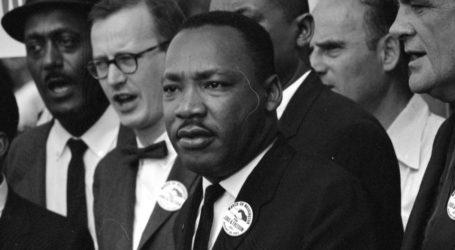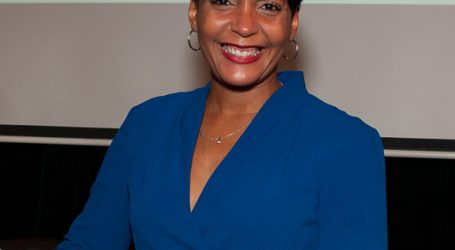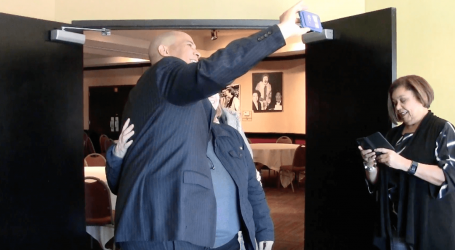Black Contractors Cry Foul; Say They’re Not Getting Their Fair Share of City Contracts.

By Maynard Eaton
“Black contractors have been squeezed out of the market.” – GBCA President Margaret Muhammad.
“Black contractors not getting their fair share of contracts is a racial issue.” – GBCA political consultant Steven Muhammad.
The Georgia Black Contractors Association [GBCA] say it’s 500 or more members have been wronged and unfairly treated by Atlanta’s political and business leaders. That’s why during their 9th annual Business and Construction Expo on Thursday, September 7th at the Renaissance Concourse Atlanta Airport Hotel they will issue a plaintive plea for a return to the days of Mayor Maynard Jackson when affirmative action on Atlanta’s construction projects was 30 percent share for African American contractors.
That’s not so now! GBCA president Margaret Muhammad laments that while Atlanta has elected Black mayors ever since 1974, Black construction workers and companies now receive much, much less–if anything — from the building boom in Atlanta that is occurring now and during the past decade.
“The sad story is Black contractors have not been what they used to be since the days of Maynard Jackson,” she says. “After Maynard Jackson finished his second term as mayor in 1982, we have not had the same level of participation in contracts and opportunities in Atlanta. Things have just gone downhill. It’s not the same solid 30 percent that went on for years in Atlanta. That has changed.”
That’s because The Southeastern Legal Foundation successfully sued Atlanta in 2001 arguing that it’s affirmative action set aside programs for Blacks and women were unconstitutional. They took that national precedent setting case to the U.S. Supreme Court.
“We are less than 10 percent on most contracts,” says Margaret Muhammad. “The problem now is that there are no set-asides, everybody has goals. And, they can put their goal at whatever number they want. Some people put it at 20 percent, some 30 percent but that doesn’t necessarily mean that they are going to make that goal. And, even if they do, they use a minority quota which is used against us now. Minority now represents virtually everybody that is not a white male. As a result, Blacks are now the very last group in that minority quota. They will say, ‘I have fulfilled my minority quota’ and that often means white women, Asians and Hispanics. And, Blacks are left out.”
That’s why her husband, longtime political activist and GBCA’s political consultant Steven Muhammad is determined to make the diminished opportunities for Black contractors an issue in the current Atlanta mayoral race. It has not yet become an topic in the contentious campaign. That is subject to change.
“Black contractors not getting their fair share of contracts is a racial issue, and no one is talking about race in this [political] race. Everyone is talking gray” he contends. “If race becomes an issue, then the issue of Black contractors and Blacks getting their fair share of governmental contracts must be addressed. The Georgia Black Construction Association feels that whoever is the next mayor should address this issue on the front end. We should know where they stand on Black firms getting their fair share of governmental dollars before we go to the ballot box on November 7th.”
Peter Aman, a City Hall veteran, former Atlanta Chief Operating Officer and political novice, kicked off his Atlanta mayoral campaign by boldly declaring that “race frames this election.” And, throughout Aman’s campaign, that has seen him rise steeply in the polls, he has aggressively continued an “up-front emphasis” on the race issue in Atlanta.
“Not only am I committed to maintaining the DBE/EBO programs in the city, I believe there are ways we can protect and expand them to include more small and medium sized businesses,” says Peter Aman. “My commitment extends to and includes Hartsfield-Jackson Atlanta International Airport.”
Councilwoman Mary Norwood, the current leader among the 13 candidates for mayor says, “I have given a personal commitment to The Black Contractors Association that as Mayor, I would appoint a task force of qualified, field-related specialists to include builders, contractors, engineers, financial officers and other specialists to review the procurement process and to make recommendations to the city. I am unwavering in my commitment to ensure black-owned businesses continue to benefit from city contracts. I am equally as concerned about women-owned businesses benefiting as well. Considering the DOJ investigation, I want full and fair participation in the M/FBE program. As Mayor, I want the city to be “best in class” when it comes to procurement practices.”
Another mayoral frontrunner, City Council President Ceasar Mitchell, was the only other mayoral candidate to reply to this reporter’s email request for a comment. Mitchell’s answer is perhaps the most pleasing to the GBCA membership, and to Mr. & Mrs. Muhammad’s mission.
“The pioneering programs established by Mayor Maynard Jackson four decades ago continue to provide the litmus test for diversity and inclusion across the nation,” Mitchell says. “From my perspective, today’s lack of diverse representation among Black construction workers and companies is a problem. For the past six years as President of Atlanta City Council, I have devoted time and resources to host the annual ‘Back to Business’ program, which connects minority and women-owned companies to business opportunities in the public and private sectors. When we see declines like those reported by the GBCA, we can’t pretend we’re out of the woods. As your Mayor, I will continue to support inclusionary programs because the need clearly still exists
“So, we’ve got to take a hard look at the status quo to determine not only what can be done differently to promote diversity, but also ‘the why’.” Mitchell continues in his detailed written reply about the plight and problems confronting Black contractors. “We must ensure equitable access to resources (time, talent, money) that allow black construction workers to compete. Black businesses and entrepreneurs who only recently could gain access to capital continue to tread water. Today, this once thriving subset of business-owners are increasingly being left behind.
“There is still a place for strong inclusionary programs in Atlanta. By gaining a better understanding of the root cause, we can preserve the legacy set in motion by Maynard Jackson — and truly unlock the doors of opportunity for all.” Mitchell adds.
Construction is booming in Atlanta, which on its face would suggest good times and big bucks for Black construction firms. There is a $6 billion project on tap for the Hartsfield-Jackson Airport and a $2.5 million Watershed Management project, The Beltline may be a $30 billion deal, and there is the multi-million Underground Atlanta and Phillips Arena redevelopment projects about to begin.
“That’s nearly $40 billion in the next 10 years,” says Steven Muhammad. “That’s millions and billions of dollars. If you took all of that combined, and Blacks got their fair 30 percent share, you’re talking $12 to $15 billion dollars. That’s enough to revitalize the entire Black community and create jobs.”
Presently the state of the Black construction industry is far from healthy. Many Black contractors such as welders, carpenters, electricians, roofers, landscapers, plumbers and plasters are among other tradesmen are suffering. Ten years ago, the state of Georgia required licensing for all contractors.
“Prior to then, a person could just put his shingle up or a sign on the side of his truck and get a business license and he could renovate your home,” says Margaret Muhammad. “But now there are strict license requirements, and these requirements knocked out some 70 percent of Black contractors. They are now unemployed. They can’t work. Black contractors have been squeezed out of the market.”
You still have the big boys; the hugely successful Black owned construction firms. You have the H. J. Russell Company, C.D. Moody Construction, and the Winter Johnson Construction Group to name a few. Yet former industry giants like E R Mitchell Construction and Thacker Construction are gone.
“Those were big boys a few years ago. These were $30 to $40 million companies 15 to 20 years ago. Now they are history, “says Steven Muhammad. “It seems like there’s been an attack and an assault on Black contractors to move us out of the business because they knew this day was coming to where Atlanta would be ‘Boom City’ and if Black contractors no longer exist then they no longer have to give them any work.”
Muhammad continues, “We’ve gone through eight lean years, so what we want to do under the next mayor is have eight green years so that we can eat. The work is out here. It is not for lack of work, it’s for lack of opportunity.”




